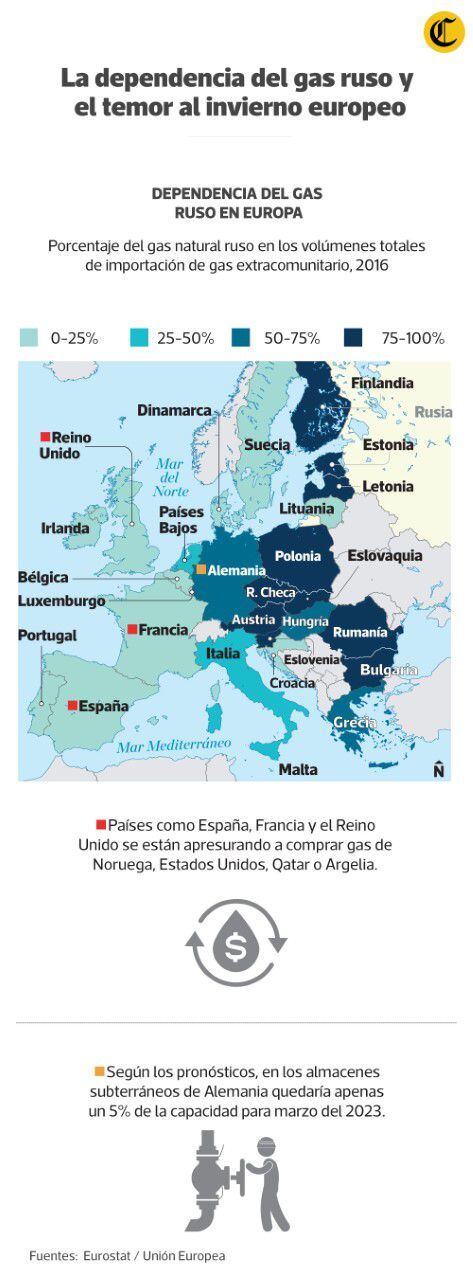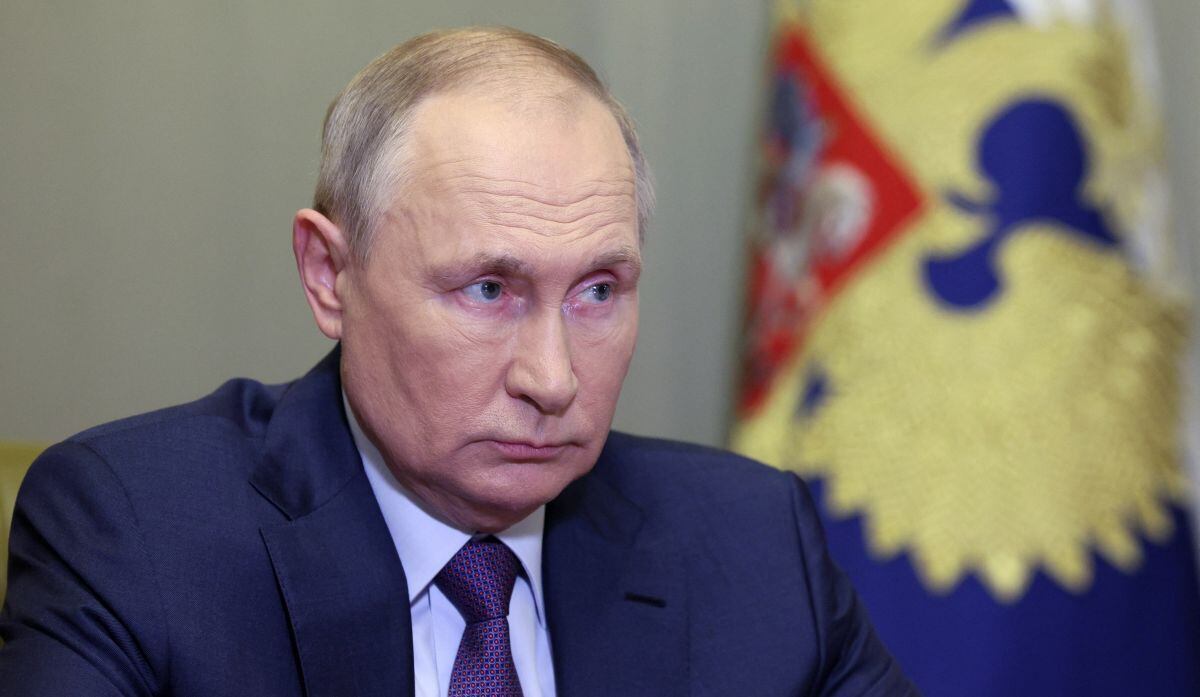Vladimir Putin looking forward to the start of winter in Europe. After several setbacks in the war in Ukraine -on and off the battlefield-, the arrival of the cold presents itself to the Russian president as an opportunity to use the gas card in his favor. How can this precious resource influence the course of the conflict?
READ ALSO: Spain bets on energy independence to end Putin’s “blackmail”
Added to the energy crisis due to the war is the imminent arrival of winter and the risk of cold waves starting in November and December. Many governments have asked citizens and businesses to lower the thermostats and save energy. The goal is to avoid energy rationing and blackouts. The concerns are not unfounded. This year, added to the uncontrollability of the climate is the geopolitical struggle that confronts the West with Moscow.
Putin has the upper hand after cutting off Russian gas exports to Europe in retaliation for sanctions imposed by the European Union (EU) vs. Kremlin for the invasion of Ukraine.
In response, the EU has reaffirmed its plans to reduce consumption of gas 15% east winter, relative to the usual mean. Some nations have even rushed to buy the precious fuel from other suppliers such as Algeria, Qatar, Norway or the United States. Despite the efforts, the panorama is challenging before the arrival of the wintereven more so for the countries most dependent on gas in Russianamong them Germany.
Evidence of the growing concern is that the EU seeks to launch a system of joint gas purchases next year to acquire the fuel at a lower price with a view to winter 2023-2024, which is expected to be even more critical than the one to come.
“Next winter could be even more difficult than this winter. We have to start preparing now.”, said the Executive Director of the International Energy Agency, Fatih Birol, who remarked that in 2023 the “markets will be tighter”.

Opportunity for Putin
Enrique Banús, director of the Institute of European Studies of the University of Piura, considers it evident that the climate is going to play a very important role in the conflict because winter in some parts of Europe it can be very cold.
“It is a tactic of historical tradition of the russians the wait for winter to beat. They have done it with the invasion of armies and now they are doing it with the use of oil and especially gas. Putin knows that what was done with Napoleon was to wait for winter and with the Nazis as well. He is now not only waiting for the winter, but is shelling important Ukrainian facilities from an energy point of view. Everything indicates that he wants to make the Ukrainians and Europeans cold”, he tells El Comercio.
The impact of a winter cold could be very big. Banús points out that if the citizens begin to feel cold they will go out to protest and then some governments may falter in their conviction and in the sanctions against Russia. “I believe that Putin is calculating this, he has just changed the military commanders and has put very rude people in charge and is attacking civilian installations. He is preparing the winter“, Add.
For the West, Putin is using energy as a tool of war, European leaders such as the President of the European Commission, Ursula von der Leyen, have said.
International analyst Roberto Heimovits points out that although winter is a great opportunity to Putin because Europe relies heavily on gas for heating, dependence on Russian gas has been reduced.
“Before the invasion, Europe imported 40% of the gas it consumed from Russia, in the case of Germany, 55%, but with the sanctions and reprisals, specialized sources indicate that only 9% is being imported and there are reserves. Norway has replaced Russia as Europe’s main gas supplier and alternative sources are being sought, such as Algeria, which has signed contracts with Italy”, he tells this newspaper.
Putin said this Wednesday the 12th that Moscow is prepared to resume the supply of gas to Europe through a link from the Nord Stream 2 pipeline what about Russia a Germany under the Baltic Sea and that it has never fulfilled its objective due to the tensions of the war.

Speaking at an energy forum in the Russian capital, the president again accused the United States of being behind the explosions that destroyed the two links of the pipeline North Stream 1 and one of the two links of the North Stream 2 and affirmed that those who attacked the pipelines want to weaken Europe by stopping the flow of cheap gas from Russia.
On the same day, the Russian gas giant Gazprom stated that the European Union may suffer a gas deficit of 800 million cubic meters per day during the coming winter in the event of high demand caused by extreme cold.
European strategy
In the geopolitical game of gas some countries are more complicated than others. Dependence on Russian gas in some countries is very high, especially in Germanyalso in Francebut the Gallic country is going to receive help from Spainexplains Banus.
Spain has a small dependency because it receives the gas from the north of Africaspecifically from Algeria. Other nations with little dependence are those that changed their energy policy in time, including Lithuania, Latvia, Estonia and Sweden, which are already receiving Liquid gaswhich is the alternative.
“Among Germany, which has a very high dependency, and the Scandinavian Baltic countries that came this long ago and replaced that dependency with other sources, there are going to be many differences. But if Germany gets cold, Europe trembles and may end up cracking the unity of politicians”says Banus.
He explains that the strategy being followed in Europesome countries with more time than others, is the commitment to liquefied gas, which basically comes from the United States, but also from Norway and some African countries.
“The problem here is that technological solutions are needed that are not easy because you have to liquefy the gas, transport it and then gasify it again, so you have to have very important liquid gas storage capacities in the ports. The other issue is to maintain nuclear power plants, although everyone was already closing them”, adds the expert.
Heimovits adds that the little sympathy for Russia and by Putin that exists in Europe makes it difficult for the European public to be willing to compromise this winter. “It is likely that there will be cracks, that the population of one or another country will falter, but it is not certain, especially if the Russians continue with the atrocities in Ukraine,” he says.
“And in the long term, with everything that has happened, it is most likely that Europe will meet its objectives and stop depending on Russian gas, which will be a serious economic blow to Russia.“, Add.
Source: Elcomercio
I, Ronald Payne, am a journalist and author who dedicated his life to telling the stories that need to be said. I have over 7 years of experience as a reporter and editor, covering everything from politics to business to crime.

:quality(75)/cloudfront-us-east-1.images.arcpublishing.com/elcomercio/4ZMU3GNXNRBY5I2PRA2RT2B5FI.jpg)


:quality(75)/cloudfront-us-east-1.images.arcpublishing.com/elcomercio/6FEJGNHZIBGIBOCUUNLG7YBDC4.jpg)
:quality(75)/cloudfront-us-east-1.images.arcpublishing.com/elcomercio/BQGQ3Q766BEGXATYW56VSVIQEY.jpg)

